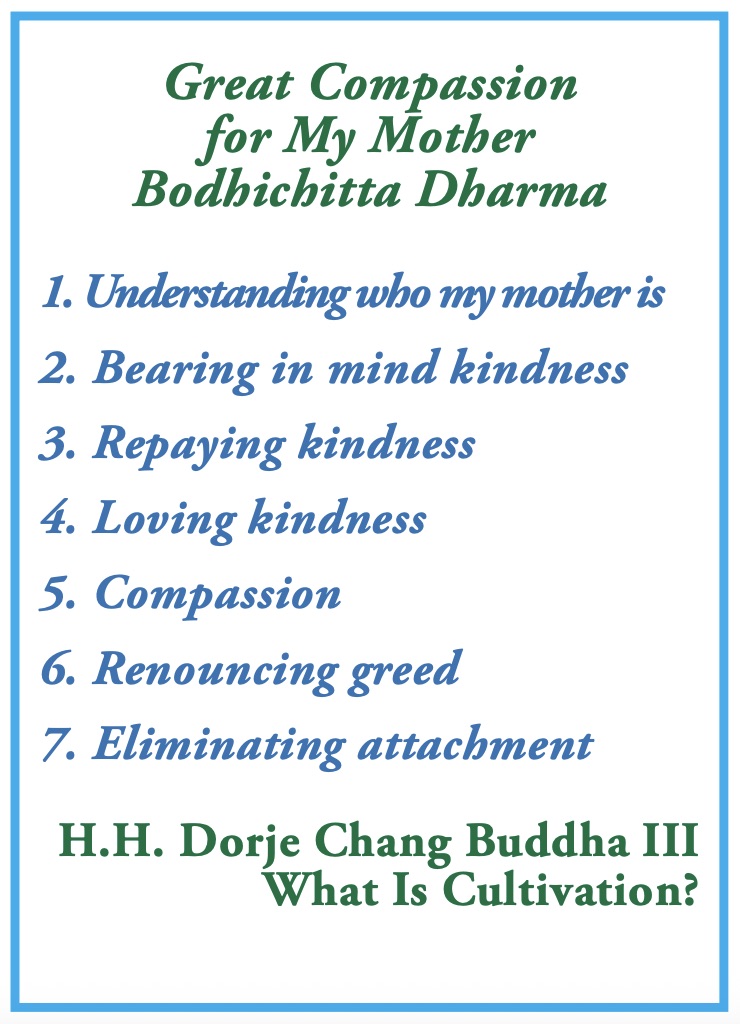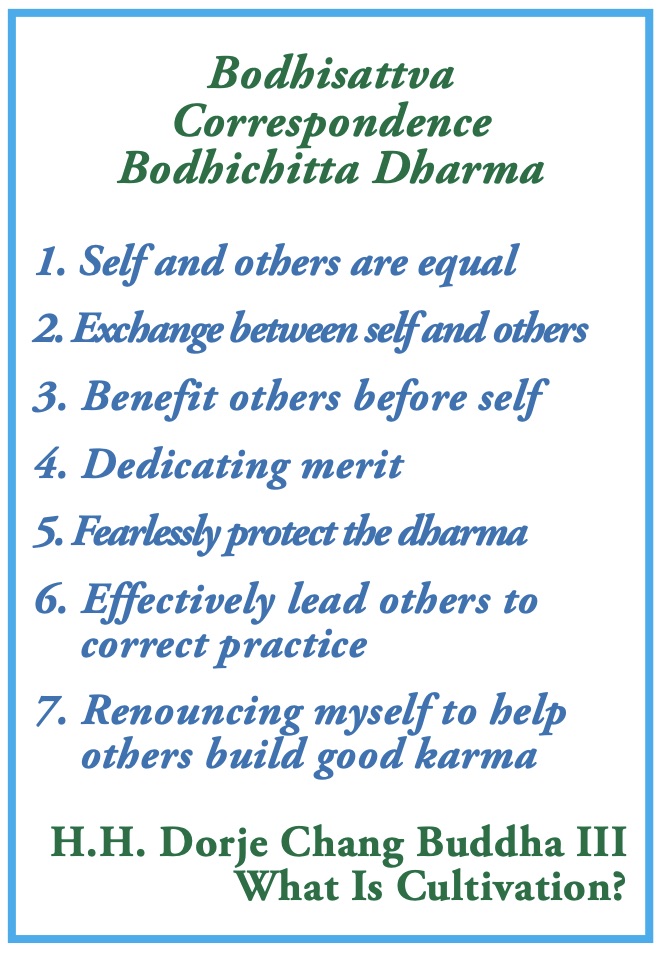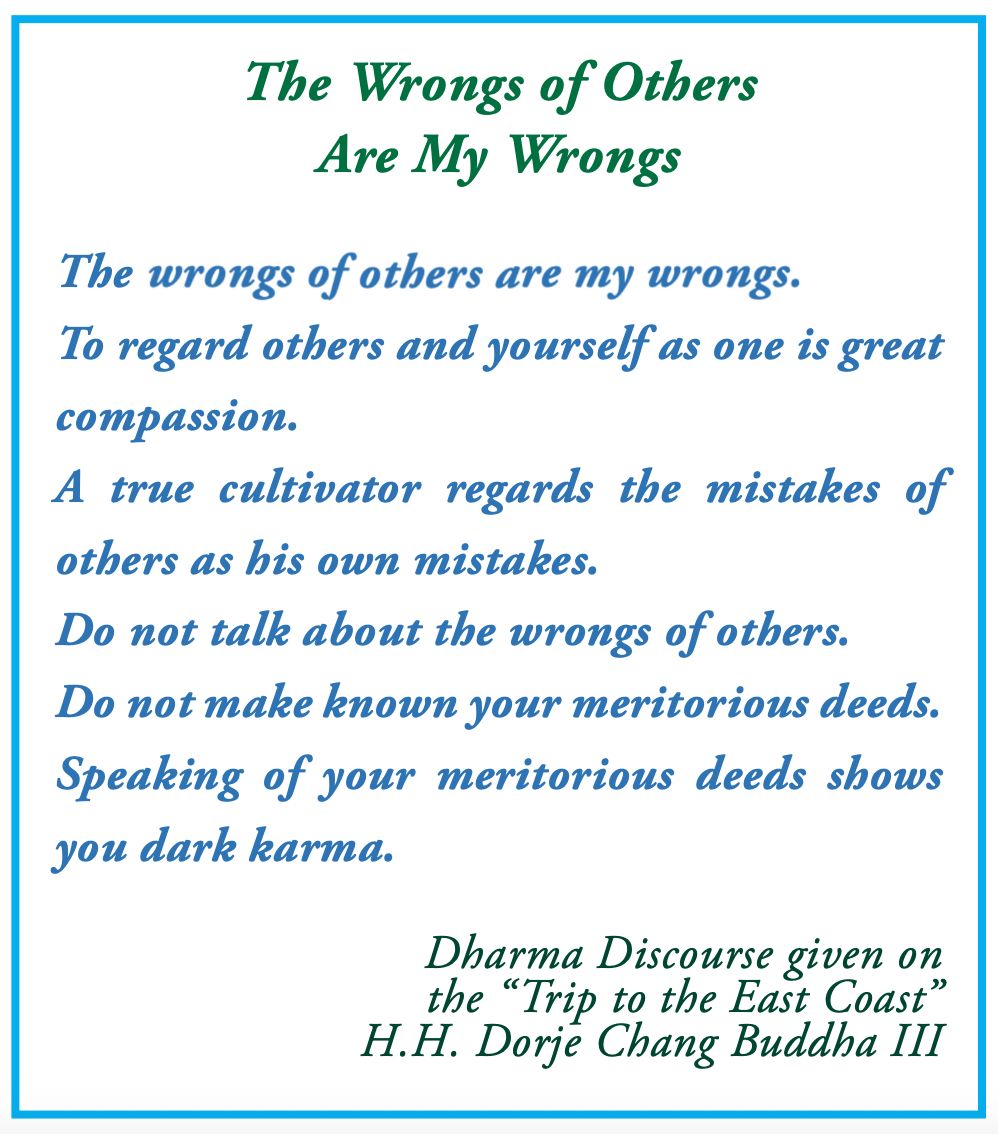True Compassion
Reposted from Thus Have I Seen by Zhaxi Zhuoma Rinpoche p.202-205
I do want to try to express what I have learned about compassion from my Master, as I consider it the most important Dharma I have received. Like karma, it is complicated and not always what you might think it is. It is helping someone in such a way that they may become liberated, and not giving them what they want or what you think they want or should have. Only an enlightened one has such wisdom to know what that is. Only an advanced Bodhisattva or Buddha can see the past and future karmic conditions of that person. That is why it is so important for us to first become enlightened ourselves only then can we truly help others. Do we not do anything when we sense an injustice or see someone in pain? I said it is complicated.

Interventions without knowing the facts of the matter might not be a good thing, but we need to apply the two sets of seven principles for developing bodhichitta as best we can and always look deeply at our motivation, and weed out any selfish attachments that may adversely affect our decisions. Too often we intercede to make ourselves feel or look good and not to help anyone else. Always introspect and keep checking your true motivation, and pray for guidance.
I will give an example. My Buddha Master told a story about one of my vajra brothers. Everyone else was laughing, but I was horrified. I said, but what he did was despicable! “Yes, what he did was despicable,” my Buddha Master agreed and continued on with the story. I could not put that down. I fumed and I fussed and went home and fumed and fussed some more. I couldn’t sleep that night. That was not right! How could the Buddha let such behavior continue? How could my other vajra brothers and sisters just laugh about such outlandish and selfish behavior? I was so angry over all this, that I was prepared to go the next day and ask that my name and pictures not be included in the treasure book H.H. Dorje Chang Buddha III if this person was also going to be in it. That is how upset I was and how absurd my behavior was.
But first, I had to read a translation of one of the Buddha’s discourses to a group of students. I managed to calm down enough to do that, but it was still my intent to go to my Buddha Master and make my request as soon as I was finished with the class. I came to one sentence in the discourse and it hit me like a bolt of lightning. I was so ashamed. The Buddha said something about the fact that the Buddha had all sorts of disciples. Some were very great Bodhisattvas and some were bums and scoundrels. Only then did I get it. This vajra brother may have done something quite despicable, but he was a living being and the Buddha was still going to teach him. Also, there were very many virtuous things that this person also did. I was like that too. I made many mistakes, but still my Buddha Master continued to teach me. The Buddha never gave up on me, although I have been ready to give up many times. And just maybe there were more reasons as to why the vajra brother behaved the way he did than I understood. Instead of asking to be taken out of the treasure book, I went to my Buddha Master and repented for my ignorant, arrogant, erroneous, and evil views.
In the sutra A Monk Expounds the Absolute Truth to a Layperson, written by the Buddha when he was quite young, the Buddha expounded that the conduct of Bodhisattvas is much different from the conduct of ordinary people. In the mind of Bodhisattvas, there is no differentiation between good and evil. At every moment, they are examining their own faults. They immediately correct their slightest faults. They never see the faults of other people. They also do not see their own good fruits. They constantly hope that living beings will soon escape from the cycle of reincarnation. This is true compassion and profound.

We have added a new chant to our morning service that the Buddha Master transmitted while on a road trip with His senior students entitled “The Wrongs of Others Are My Wrongs” along with the two branches of seven principles on developing bodhichitta listed above from the “What Is Cultivation” as part of our daily reflection. This reflection is part of our daily homework.

I have one more personal experience on how Holy Beings are different from ordinary beings, not only in how they exhibit compassion, but in other matters as well. At one time I was with the Buddha Master’s wife almost every day. I was helping her learn English and she was helping me learn Chinese. I even had lunch with her and the Buddha Master often during this period and I was able to observe the Buddha Mother in many situations. One thing I remember was that it was very difficult for me to explain sarcasm to her in an English article we were studying. It was not a concept she seemed to have had previous experience with. However, the most remarkable thing happened when her mother died. I know she loved her mother and had not seen her for many years, but I had no awareness that her mother had passed on. It was only when her mother’s beautiful and elaborate shariras arrived that I realized what had happened (FIGURE 84). Holy Beings and ordinary beings are different.

FIGURE 84: Elder laywoman Wang Cheng E-Fen’s sharira.

